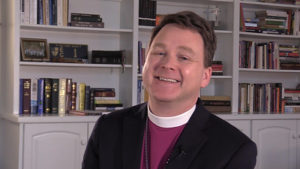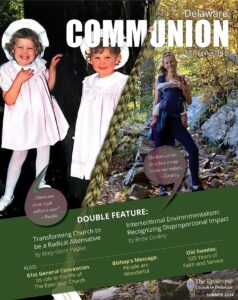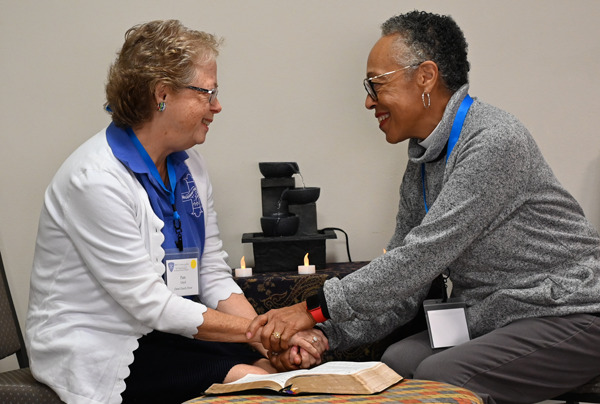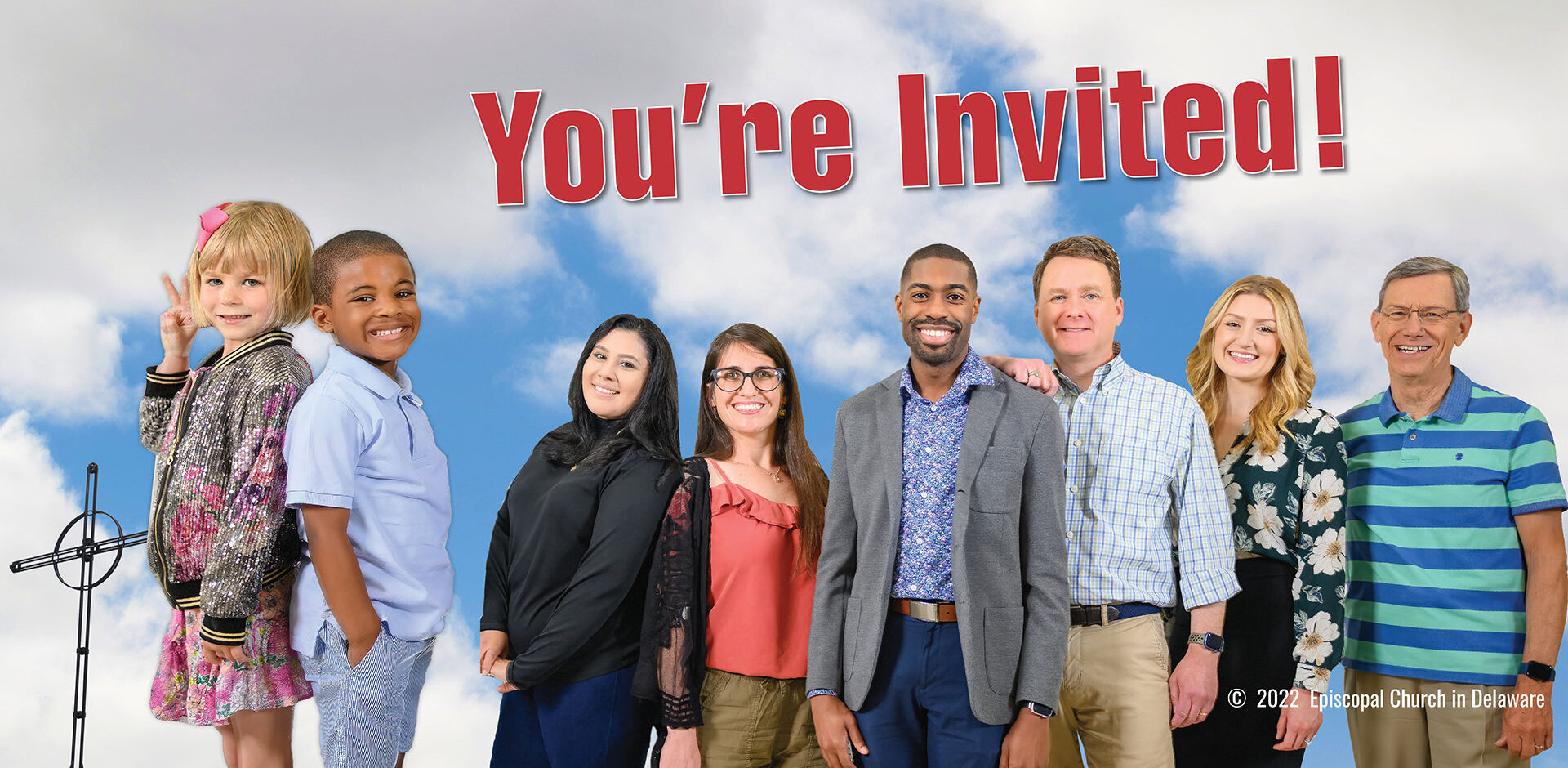Report by Kristin Sausville, St. Thomas’s Episcopal Parish, Newark, DE
In early March, I had the opportunity to attend, for the first time, the annual conference of the Episcopal Parish Network in Jacksonville, Florida, where more than 700 Episcopalians gathered. Our rector at St. Thomas’s, where I am serving as senior warden, had attended previously and recommended that I attend this year as well. I am very glad that I did — I came home feeling reassured, energized, and optimistic about our future.
For the pre-conference sessions, I met with wardens and other vestry members from parishes around the country. To my surprise, it turned out that regardless of congregation or budget size, most parishes are dealing with similar situations, particularly as we emerge from the years of the covid pandemic. How do we handle having an online-only contingent of our congregations? How do we engage with youth and young adults? How do we reconnect with parishioners with whom we’ve lost touch? How do we increase our role in our communities? How do we utilize technology to meet people where they are? What is our future?
Many good ideas were shared. It seemed like most parishes had figured out a tiny piece of those puzzles, and putting us all together, sharing those ideas, made for what felt to me like a brighter bigger picture. Some parishes were finding success with evening services, contemporary music and/or services, dressing more casually (so as not to intimidate those who got comfortable with sweatpants during lockdown), developing small groups and after school programs, and making newcomer greeters more visible. Increasing communication was emphasized — wardens who personally called all parishioners, as well as reaching out to previous members and families of deceased members for brick fundraisers and flower donations.
Communication also extends to promoting what we’re doing. We can’t be afraid of reaching out and even advertising. Some parishes had success with the broader community for programs like a questioning faith series for adults in their twenties and thirties, groups for young parents, and a Bible study devoted to hard questions that was open to all, whether Christian or just curious as to what Episcopalians believe about controversial topics.
Technology seemed to be something that was seen as a crisis by some parishes, who were encouraged by those of us who have found opportunities in it. At St. Thomas’s, we invested in quality live-streaming and have implemented a digital usher program to engage with those attending via YouTube in the chat, which turned out to be encouraging news for those present who had grown frustrated with the growing realization that some members will always be attending online now and not coming back in person. I was so happy to have something to contribute on this front, and hopefully encourage other parishes not to think of their online attendees as anything less than full members of the congregation. Someone even emailed me later to ask for our digital usher script!
Technology can solve other problems as well. One parish is using less paper for service leaflets by making a QR code available for those who prefer to follow along on their phones or tablets. Other parishes are making technology assistance one of their outreach ministries, and one was even making a computer lab available to the public.
We also can’t be afraid of considering radical ideas. One attendee was from a parish in Virginia that realized their building no longer suited their congregation size. After discernment, and with the support of over 90% of the congregation, they demolished the building, ground-leased some of the land for an apartment building with over 100 units for lower-income residents, and built a smaller church building next to it on the property. They were so happy with how the process had gone and worked out for everybody. This kind of out-of-the-box thinking made a big impression on me. I recently did a reading plan that covered the entire Bible in just ninety days; while not ideal for finer detail, a broader picture that was very clear to me is that God keeps trying new things in order to reach us. We shouldn’t be afraid of trying new things to carry out building His kingdom.
Social justice is a way that some parishes have found to do that work; it was a topic that first came up in this pre-conference session, and kept coming up throughout the conference, including a workshop that I attended on the Future of Beloved Community. Several attendees from different parishes reported having come to the same conclusion — that the Gospel is political, even while not necessarily being partisan. The things that we are called to do in this world are political, and as Christians, we can agree on them no matter where we fall on the political spectrum. As was pointed out in the Beloved Community workshop, not discussing social justice and politics is itself a political position. The parishes that had launched initiatives working on social justice issues found that they were engaging youth and young adults in particular, and that there were opportunities to increase connection within the community by partnering with local groups who are already doing this work. During the Beloved Community workshop, it was made clear that we need to be open to being disrupted, and we need to delve into what may be painful histories in our parishes — we may have had historic roles in perpetuating white supremacy, whether it was owning enslaved people or fighting against integrated schools and neighborhoods. As was said, we cannot fix the external until we’ve fixed the internal.
Another workshop I attended was the Future of Congregations, where one of the presenters was our diocese’s own Cynde Bimbi. We were first asked to imagine what our congregations will look like in twenty years, what will they need, want, and desire, and what question we would have for them. These are questions that all parishes, or at least their leadership, should start asking themselves. The way to prepare for the future is to try to imagine what it will look like, or what we hope it will look like, because only then can we begin to figure out what steps we need to take now to lead us there. As Cynde reminded us at that workshop, “We need to be more proactive and less reactive”.
It was clear from some of the conversation and questions from attendees at that workshop that there is a lot of apprehension about where new technological changes like ChatGPT are going to lead us. It was reassuring to talk about how our institutions and practices have already survived many technological changes over the past 2000 years (I can only imagine the reaction to the printing press!). Nothing has changed the need that people have to connect with each other, and nothing has changed about having a soul. Technology can’t replace everything — food delivery app usage grew during the pandemic but didn’t replace in-person dining, as an example — and hopefully we can continue in finding ways to work it into our mission, as we’ve been doing all these centuries. A flip side of that is that we know that technology such as social media can have a negative effect on some people, particularly anxiety for youth — this is a way in which we can be there to pastor people.
During this workshop Cynde also reminded us of the words from one of the keynote speakers, historian Jon Meacham, “stop lamenting and start leading.”
Yes — we had the opportunity to hear from inspiring keynote speakers at the conference. I attended the speeches of Meacham, the Most Rev. Thabo Cecil Makgoba (the Archbishop of Cape Town), and Mari Kuraishi (the President of the Jessie Ball duPont Fund). All of these offered a lot to learn, and I was so grateful for the opportunity to hear from all of them.
The Jessie Ball duPont Fund also hosted a lunch discussion on Fostering Mission-Driven Development at the Jessie, a building that they’ve revitalized and now utilize as a shared space not just for their own offices, but multiple other community and non-profit groups in Jacksonville. The building had previously been a public library that had fallen into disuse but is now vital and active with all of the organizations sharing it. The emphasis was on the space truly being shared space — there are resources in the building available to all of the organizations, and the Jessie Ball duPont Fund has no greater priority in reserving those common resources than anyone else.
All of this painted an overall picture that left me feeling optimistic and energized about all of the work that we can keep doing, as long as we are willing to let our mission drive us. We need to be brave, bold, and open to maybe church looking different in the future than it has in the past. We need to work together and reach out to those who have already started on this work — there is no need to reinvent the wheel and we are stronger when we work together. We need to trust God when He leads us to new places. I hope to see you at next year’s EPN conference!





